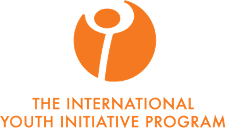The End of the Outpost
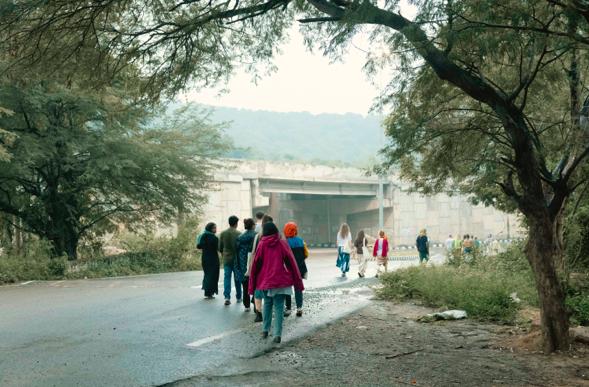
Dear friends of YIP,
We hope this Newsletter finds you well,
This month has been a time of transition for us at YIP with the Outpost coming to an end and the participants going off on their Internships. In the second week of February, we packed our bags, said goodbye to Auroville and to each other momentarily, as the yippies boarded the flights that would take them in their small groups to their different internship locations. Scattered across seven countries across the globe, the yippies are now living and working with people and initiatives addressing pressing needs in the world.
The closing of one chapter of YIP17, a journey that has been so full of beautiful, challenging and awakening moments will live on in all of us. We are incredibly grateful for all the ways that the Outpost has worked out well and for the struggles that it brought that’s bringing us to a closer realisation of what we want YIP to be. The things we faced in ourselves, each other, and the world in the last three months brought out the question of what YIP17 means for YIP17 – asking us what it is that we want to carry amongst us and what it means for each one of us to be here amongst each other now.
We are deeply grateful for the warmth we’ve been met with throughout this journey, to the strangers that have become friends, to the people that pointed us to the right places, to all the eyes we exchanged kind smiles with and to each other for making this journey what it became.
This newsletter will take you through our last weeks in Auroville, the transition to the Internships, and a looking back on the Outpost from two voices within the participant group.
Written by Sydney Dinopol
In this newsletter you will find:
– Being Human in a Technological Age written by Bella Nicolas
– Relational Responses written by Sarah Bennett
– Internship Departures written by Matvey Melnikov
– Looking Back at the Outpost written by Nele Goertz and Linh Nguyen
– Message from the Participants: Initiative Forum 2025 written by Robert Martens
– Message from the Organising Team: YIP18 Applications
– Alumni Project: TWIIIINS Music written by Dowon Kim (YIP15)
Being Human in a Technological Age
With Elias Diaz
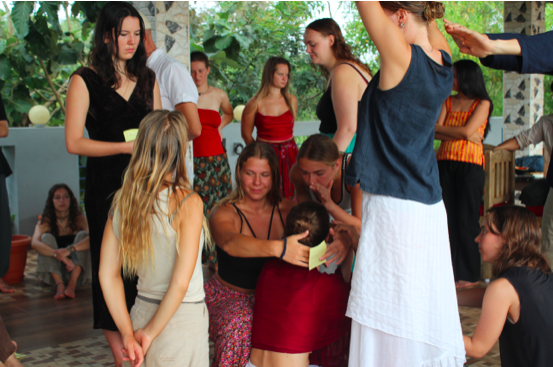
We close our eyes and take deep breaths, beginning and ending each session by centering ourselves. This helped in preparing us each time for a deep dive into discussions on each of our experiences on being a human being in an ever changing world—with the latest updates being AI technology, accompanied by the ever present fear “Will AI replace us?” promptly followed by the weight of the question of “What does it mean to be human?”. Elias Diaz, our facilitator, invites us into discussions, encouraging the curiosity that lives within each one of us. It was evident how much he valued the human perspective by taking us from the macro to the micro, from reflecting on the world around us, to delving deep into the process of pure thought and what it means to be present.
On our very first day, a group of us eventually came to wonder how we could create a definition for technology. There were some of us who were convinced that technology was a bad thing, a burden on our lives that added more weight to the pockets of capitalists. Then we stepped out of the digital aspect and realized how big the scope of technology is, and how it touches each of our lives. From basic everyday tools, our fridges, vehicles and houses, to the different languages we have access to. Eventually someone humorously pipped that “Our body is a technology for our soul” this concept we discovered, later grappled us as we questioned the process of thinking and what the meaning of consciousness is, and how many layers there are to peel in order to get to the essence of ourselves. Through this discussion and the guidance of Elias we settled onto the definition that technology was a creation that was a means to an end, and that it was up to the user what purpose was served.
The presence of technology could only be possible by the creativity that lies within us. In one of our sessions, through storytelling and active listening, we each expressed our experience when we felt the most creative in our lives. It was our consensus that when we were creative we felt boundless, as if infinity lived within us. We explored this idea further as we also agreed that it was only in nature wherein we felt truly creative and full of endless possibilities. In nature, we felt like our truest selves, and it was there that we felt one with the world. What does it mean for us to feel connected and dependent on the natural world? From our basic need to breathe to the ways in which we take everything around us as a resource to make our lives easier, we believe we create independence and separate ourselves from each other and the world around us when it is strikingly evident how dependent we are on the natural world.
At our very core, it is our experiences of the world that makes us human. It is beautiful to me how from ancient civilizations, from the history of my ancestors, to the memories of my parents, and the way I navigate my life, I know everything about being human through the stories that live within us. We start like a blank slate and discover the infinity that lies within us until the time that we naturally come to an end. I believe that it is this being conscious of an inevitable end that we carry through with our lives and this makes us human. Hence it is only with awareness and by understanding that we are in control of ourselves and how our stories play out that we can grasp the fast paced development of our advancing technological world.
Written by Bella Nicolas
Relational Responses
With Ishaan Aggarwal
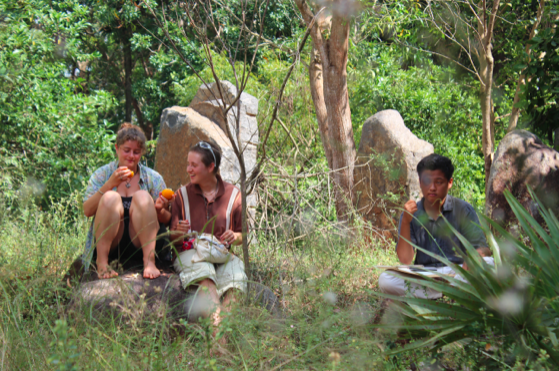
We began this week sat outside on some rocks as the hot Tamil sun beat down on us and we described where we are in life in three words. Some of the words that I remember were: questioning, enquiry, freedom, adventure, power, love and bumblebee. This task, and the sun, warmed us up, as Ishaan introduced the lens for the week, taking a planetary and ecological perspective on matters of the world.
The days that followed involved inquiring about the current climate crisis using this lens. We discussed how the earth is experiencing the 6th mass extinction (the last time being the end of the dinosaurs, 66 million years ago). These discussions were reminiscent of talks I had heard at school, university and in climate activism spaces. I was left questioning how and why humanity continues to partake in the systems which science has repeatedly concluded to be environmentally destructive.
What does it mean to be humane when humanity is doing this?
Ishaan introduced a new term to me this week: Ecosophy. The epistemology of this word meaning wisdom of the home/habitat. This term suggests that we need to seek healing from the memory that the earth is our home and shift away from cultures of domination, control and accumulation. Despite this term emerging in the 1970s, the ideology of caring for the planet as our home is not new. In all indigenous cultures, care, respect and gratitude for the earth is embedded in their way of life. Knowing and honouring the sacredness of the earth is what I believe to be crucial in changing the current capitalist mindset.
This week fuelled my curiosity regarding how we can tackle the climate crisis without perpetuating judgement, hated and polarisation of the “bad guys” who are responsible for large scale environmental destruction. What do I and Elon Musk have in common? How can I hate the capitalist system and simultaneously love and appreciate humankind when capitalism is made and sustained by humans? These paradoxes live in me as the week draws to an end.
Written by Sarah Bennett
Internship Departures
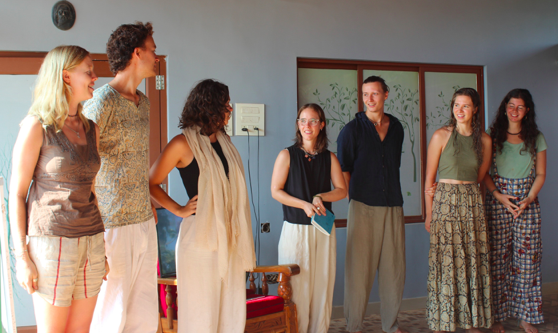
After three beautiful months in India, filled with growth and learning opportunities, we began preparing ourselves to head towards our internships. An interesting dynamic was filling the community space. We sensed that something new was approaching us — a time without the whole group around, a new setting offering opportunities and possibilities to connect with people in ways we hadn’t before. Growing, learning, and living as a more independent group in new communities was the next step for the divided Yippies.
Before our departure on Thursday, we had:
- Beautiful internship presentations from each group and volunteering at the Matrimandir and the Youth Center of Auroville on Monday.
- Initiative Forum and self-designed curriculum preparations on Tuesday.
- An emotional checkout on Wednesday.
- Packing and saying goodbye to our housing and the Solar Kitchen with a farewell song on Thursday.
That same evening, all the groups except mine—the Gili Eco Trust (Indonesia) group—boarded the bus heading towards the airport. Our group stayed one more night at the Sincerity Guest House and departed for the airport the next day. As I looked out of the car window, I realized that I would probably never see this beautiful Indian landscape again, or at least not for a very long time.
Written by Matvey Melnikov
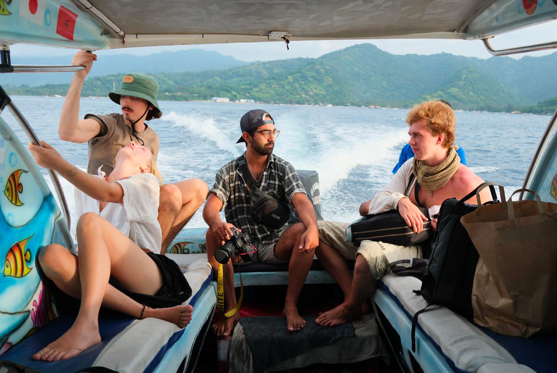
Photo by Alexander Spencer
Looking Back at the Outpost
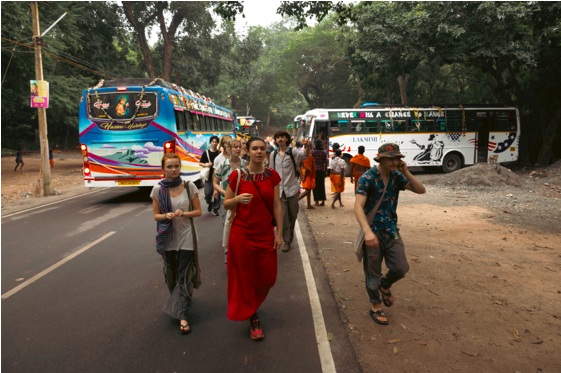
Part 1:
Being here in India feels like I’ve lived two lives; one in Cesci and one in Auroville. The reason why is that each of them offered me a completely different perspective and therefore reality and understanding of India. But I have to admit that India is still a riddle to me.
I remember it took me one week to realise I’m not in a documentary about India, but I’m actually in India itself. Maybe because its my first time out of Europe. Being confronted with such a different culture from mine, took time for me to land in Indias reality. And I think I’m still trying to understand how this reality here exists at the same time as the reality in Europe.
There was one day in Cesci where we were helping collect trash in a village. I was there only for some hours. Only for a glimpse, the villagers and I shared our realities and formed one. I entered their home, their life. But I had the chance to leave it as well. To continue living my reality. This day sharpened my awareness of my freedom. Just because I was born in a specific place on this planet makes me more free than others. I’m free to go and do what ever I want whereas many of these villagers may never leave further than to the nearest city. We shared one moment of our reality but we continued living our own. And that’s for everyone. This planet has no true reality. And India especially has no common reality at all. It is full of contradictions everywhere. So many religions and beliefs in one spot. One example is the cow. When I arrived I thought they live “freely” on the streets because they are seen as “holy”. But actually they get kicked out when they don’t give milk anymore. And they will be taken from the streets only to be decorated with flowers for festivals such as “Pongal” (a celebration to thank the earth and cattle for the harvest). Personally I don’t think it’s a way of treating something “holy”. But that’s another lesson I’ve learned: every reality has its own context and can’t be judged without considering it’s context. People here have their own beliefs and judging India as a country that is “uneducated” and “not developed” wouldn’t be true. It’s just not developed in the sense I define a “developed and educated country”. There are things India has taught me that I would have never learned from Germany.
Spending time in Auroville has actually made me question humanity. It’s supposed to be the city of harmony and peace where all mankind live together no matter what. But all I’ve heard is how much injustice there is within. Is it actually possible to create a cohesive living without money involved? Why do we people not trust each other?
The center of Auroville is a golden, round building called “Matrimandir”. Inside, it’s made of pure white marble. In the inner chamber you find one ray of sun that falls from the ceiling on the huge crystal globe that is located in the middle of the space. It’s the place that’s made for people to find true consciousness. While I was sitting there trying to meditate I thought about how strange it actually is to view a crystal globe as something so spiritual and a tree or the human body as something so ordinary where nature is actually that which contains pure spirit, right? How can a crystal globe be seen as something so special? And nature, a wonder in itself which we won’t be able to understand fully with our minds, is treated so ruthlessly. Another aspect: millions of money were invested to realise the Matrimandir and at the same time not even 5km next to it there lives a child not knowing if it gets food today or not. How are we living being aware of all these paradoxes? How am I living being aware of all these paradoxes?
Besides bringing up so many questions, India also taught me a lot. In all this colourful chaos India actually has things that make lots of sense to me. Interestingly the most practical things always emerge out of need, out of lack, out of poverty. For example showering with a bucket. You save so much water. Or using water instead of toilet paper to clean oneself. What is it that you need for living vs what is it that you want?
Another thing I recognised is that Indian people have a different sense of danger as I do. Driving motorcycles without a helmet or building a house without safety measures. Who would do that in Germany? Maybe it’s because of their strong faith in reincarnation. What is one life if you have many?
Anyway, the time here has been incredibly enriching. It’s an experience that stays a lifetime. So many joyful moments as well as challenging times. It’s been a journey and it still is. And returning to Ytterjärna in March will feel like coming back home – not only my backpack stuffed with souvenirs but also my mind and heart filled with experiences that transformed my view on life deeply.
Written by Nele Goertz
Part 2:
In my mind, the image of all of us standing in a circle on 17 November 2024, singing “We shall be known” before leaving Järna Campus remains lively. I couldn’t utter words to say goodbye to Annie and Sweden (temporarily). We are coming to an end of the outpost, a period of time that allowed us to grow in new realities.
To me, the outpost is a living proof that we are so resilient, seeking learning possibilities out of uncertainty and oppression. Our curriculum was restructured with the 3-month outpost, and we landed in Tamil Nadu, Southern India not knowing what exactly we would be learning and creating given our prior research. We had to adapt to new settings, constraints of space, different learning processes, so much new information to digest, newness of culture, food, climate and living environments from CESCI to Auroville.
We engaged in conversations around non-violence, and studied inspiring work at CESCI, Ekta Parishad and its network. We were hosted and cared for by Jill and Rajaji who brought many guests and experts in the different fields of education, economy, politics, spiritual practices, women empowerment, community-building, etc. Many guests travelled for 8 to 30 hours just to meet us in one morning or one day. That sense of hospitality is so precious.
In Auroville, from being confused with what exactly this place was and what people were doing to be in their higher consciousness and maintain the community amidst internal and governmental conflict, we have cultivated clarity and interests. Overtime, each of us seemed to have found learning opportunities for oneself among the abundance of interesting projects happening here. With the freedom to travel and move around in the space, we’ve connected to Auroville in different ways.
We have discussed what it means for us to be at YIP in Auroville as a learner rather than a consumer, what are we contributing and adding value to in this place and what it means for us to be a YIP community. There were times that some Yippies struggled to be with the community because there was a lack of communal spaces. Personally, I am grateful because we have much respect for individual choice and presence as an adult learning program that value freedom of learning. Importantly, we have a safe space to share our struggles, questions, and appreciation. I will miss our Community meeting around the sacred candle every Friday afternoon.
I haven’t been able to properly express my gratitude for the OTs (YIP Organizing Team). It is insane and unreal that we can come together overcoming temporary challenges of visa complications. The legal requirements for me to be in Sweden and in my internship in Georgia have burnt lots of my energy, and challenged my mindfulness. This is the biggest challenge for me at YIP so far, totally unexpected. Perhaps, this is what I have to face to learn to see the world newly. Perhaps, the universe wanted to stretch my limit to conform to regulations that appears unjust, again. Perhaps, when I was in my comfort zone, Southeast Asia, I never experienced such pain and difference in power and privilege.
At YIP, I’ve encountered a new realm of mobility as a Vietnamese. Having an intention to learn is not enough, I must be a “legit” human being supported by documents! At certain points, I have wondered whether it is worth for me to venture to more parts of the world, or to go back to places that are inviting to my identity. Reinound is my hero! His calm and humorous approach to problem-solving reassured me that I would be alright amidst all this.
In the Open Mic yesterday, it touched me how through our performances we shared the inspiration behind the relationships we care about. This was our only Open Mic in the Outpost, our monthly tradition in Sweden filled with collective support for creative self-expression. I’ve painted more, sketched places with my full attention, made more crafts, composed more poems and handmade stuff. The last time I called myself creative, the one time I ever described myself as “creative” was when applying for a student club in Foreign Trade University in Hanoi in 2016, and I failed. Since then, I’ve never got enough courage to call myself creative. I grew up in a system of education that does not value creativity or freedom of expression. And here I am, for the first time I truly feel that I have creative power to unleash and expand.
Thank you YIP for allowing me to be raw, playful, creative, and new.
Written by Linh Nguyen
Message from the Participants
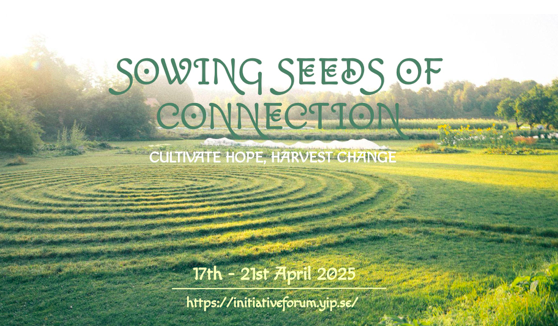
We are now about to start our internships and are using the time we are as a whole group to work on preparations for the Initiative Forum in April. We work in small groups with different focuses. It’s nice to see how the individual groups depend on each other and communicate with each other and how everything slowly comes together and becomes clearer.
I’m in the marketing and design group and we are in the process of announcing the confirmed contributors! With the theme of connection, we chosen contributors who speak to this topic in different ways. For instance, contributors that speak to connection to the land; connection to relationships; connection to grief; connection to movement and so on. We are excited to reveal these contributors to you! Keep an eye on the Initiative Forum instagram to get up-to-date information about our confirmed line-up and program.
With only 65 days until the forum and with tickets selling fast, please consider buying your ticket soon to avoid disappointment! Also, there is a limited number of tickets remaining that include accommodation, so if you would like this option, book soon!
We look forward to seeing you between the fjord and forest.
Written by Robert Martens
Message from the Organising Team : YIP18 Applications
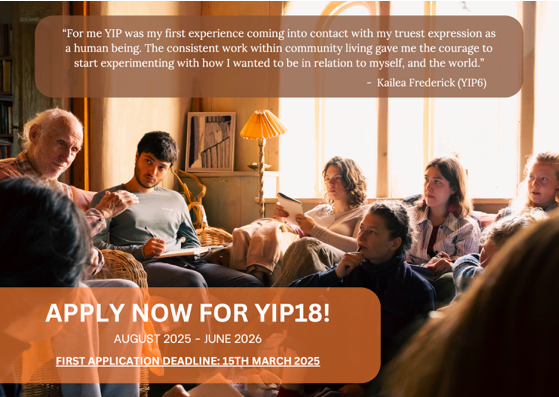
While the yippies are now on the third week of their Internships, the team is back in Ytterjärna and have begun the process of designing the YIP18 curriculum. By looking at the feedback of current participants, our reflections from the experience of this YIP year, and by exploring the themes and topics we feel relevant in the world today, the design and content for the YIP18 curriculum will slowly begin to come together.
The first round of applications for YIP18 close on the 15th of March 2025. We will reopen applications only if places are not filled by then. We encourage those who need a visa (non-EU citizens) to join the program to apply as soon as possible.
Please pass this message along to anyone in your network who might be interested and thrive in attending a program like YIP.
Apply now at https://yip.se/application/
For inquiries, please reach out to us at: [email protected]
In the next newsletter you will find:
| – Internships – Hebat el Nile, Egypt – Gili Eco Trust, Indonesia – Youth Society Parzival, Georgia – Navdanya Biodiversity Farm, India – Holy Green Agro Farm, Nepal – Kufunda Village, Zimbabwe – Open Source Arts, UK– Arrivals and Internship Presentations– Alumni Project |
|---|
